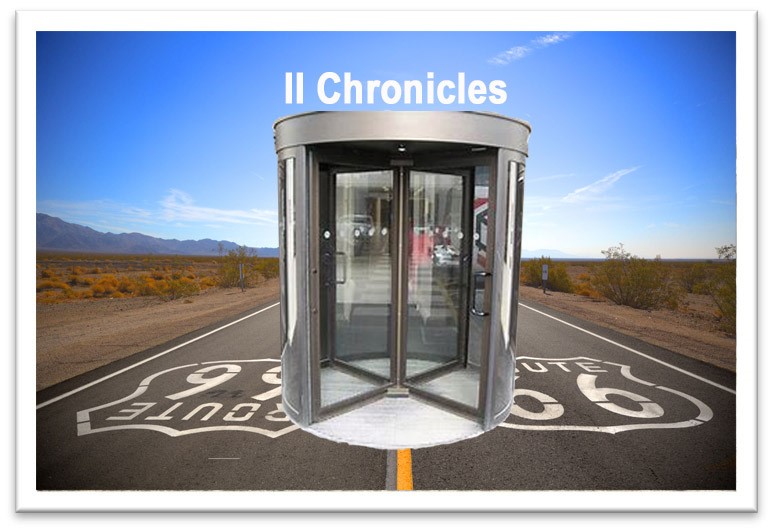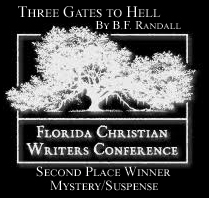 Cruising Route 66
Cruising Route 66
“Stopping the Revolving Door”
The Spirit of God came on Azariah son of Oded. He went out to meet Asa and said to him, “Listen to me, Asa and all Judah and Benjamin. The Lord is with you when you are with him. If you seek him, he will be found by you, but if you forsake him, he will forsake you. For a long time Israel was without the true God, without a priest to teach and without the law. But in their distress they turned to the Lord, the God of Israel, and sought him, and he was found by them. In those days it was not safe to travel about, for all the inhabitants of the lands were in great turmoil. One nation was being crushed by another and one city by another, because God was troubling them with every kind of distress. But as for you, be strong and do not give up, for your work will be rewarded.” II Chronicles 15:1-7
As we enter Book 14, there is one interesting, yet unfortunate characteristic about God’s people that we have seen repeated over and over again. No sooner do they get on their feet, than they take a tumble. Some of these tumbles are severe, and II Chronicles focuses on a few of them.
The reason God’s word is filled with constant reminders of failures and defeats so that we might learn from them. A quote that is often attributed to Benjamin Franklin, but actually came from a book titled, “Reason in Common Sense,” by American philosopher George Santayana, says “A nation that forgets its past is doomed to repeat it.”
We need to take a long hard look at the scripture and be willing to take stock of our history because we are about to enter the revolving door once again.
We live in a culture that seems bent on eliminating any remnant of our past that was painful, embarrassing, or outright shameful. We are trying to construct a utopia where no one is offended, and bad memories are forgotten. Unfortunately ignoring the discomfort of a painful past only leaves us vulnerable to experiencing it all over again.
God’s people were experiencing hard times, they were distressed and living in a land that had become unsafe. Sound familiar?
Every day we are told of some atrocity, and every day it seems as though the cruelty and viciousness become worse. What was once unthinkable has become the daily news. The shock of each event, no matter how appalling, is short-lived. We just turn the channel and go on.
Why does it continue? Maybe because there will always be a new horrific event to catch our attention distracting us from the last one. We won’t remember it within a week or so, and the sad truth is we simply don’t care enough to do much about it.
Take note of verse 6, “God was troubling them with every kind of distress.” Why would God do such a thing, I thought He loved us?
He does! Hard times are sometimes God-approved in order to redirect our attention back to Him. Don’t miss verse 4, “in their distress they turned to the LORD.” Though hard times bring frustration and pain, easy times can cause us to forget. We forget God, we forget our past, and depend on ourselves. Asa was encouraged to stay committed to God and not to give up on his good work.
In II Chronicles 14:2-5 we see what that good work was:
Asa did what was good and right in the eyes of the LORD his God. He removed the foreign altars and the high places, smashed the sacred stones and cut down the Asherah poles. He commanded Judah to seek the LORD, the God of their fathers, and to obey His laws and commands. He removed the high places and incense altars in every town in Judah, and the kingdom was at peace under him.
That last sentence is what we all desire, peace. Yet it has been shown throughout our history to be the place where the hinge of destruction swings. The Empires of Egypt, Rome, Babylon, and Greece all have chronicles that tell of power, prosperity, and peace. Despite their geography, origin, achievements, or their prosperity, they sunk into ruin.
Babylon, considered to be the single greatest power ever formed in human history, today is nothing more than a dusty train station along the Baghdad railroad. How quickly can a good thing go bad? History has shown that the average age of the world’s greatest nations has only been about 200 years. According to that, America is living on borrowed time, and the age-old revolving door is turning.
Consider how quickly things went sour with Asa in II Chronicles 16:7-10:
At that time Hanani the seer came to Asa king of Judah and said to him: “Because you relied on the king of Aram and not on the LORD your God, the army of the king of Aram has escaped from your hand. Were not the Cushites and Libyans a mighty army with great numbers of chariots and horsemen? Yet when you relied on the LORD, he delivered them into your hand. For the eyes of the LORD range throughout the earth to strengthen those whose hearts are fully committed to him. You have done a foolish thing, and from now on you will be at war.” Asa was angry with the seer because of this; he was so enraged that he put him in prison. At the same time Asa brutally oppressed some of the people.
Asa had no problem with the word of God when he was walking with God. Nor did he have a problem when the word was what he wanted to hear. We live in a land that has made clear distinctions between what they want to hear and what they do not. The freedom of expression is subject to the sensitivity of the hearer. In other words: If you say what I do not want to hear, then you will have no right to say it. What brought us to this place, and how do we stop the revolving door? We must first see what the cycle looks like, so we can avoid it when we see it.
From bondage to spiritual faith – from spiritual faith to great courage – from great courage to strength – from strength to liberty – from liberty to abundance – from abundance to leisure – from leisure to selfishness – from selfishness to complacency – from complacency to apathy – from apathy to dependency – from dependency to weakness – from weakness back to bondage.
Remember what it said in chapter 16:9 “For the eyes of the LORD range throughout the earth to strengthen those whose hearts are fully committed to him.”
It is not God’s desire that a nation should stumble, but stand, and be powerful, prosperous and at peace. But what is it going to take? Not a national effort, but an individual one.
“If My people, who are called by My name, will humble themselves and pray and seek My face and turn from their wicked ways, then will I hear from heaven and will forgive their sin and will heal their land.” II Chronicles 7: 14
Until next time…
Ben








